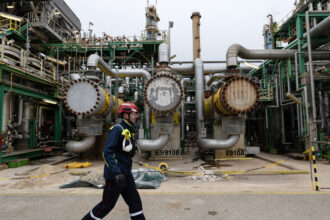It looked like the International Herald Tribune. Maybe there was something funny about that date …
European leaders meeting in Brussels today opened their morning paper to a glimpse of a brighter future.
The top headlines:
Heads of State Agree to Historic Climate-Saving Deal
Sarkozy: Nuclear is Dead
Markets Soar on News of Copenhagen Climate Deal
India Turns its Back on the Carbon Economy
Atmosphere Named World Heritage Site
Exxon Finally Comes Clean (by Petro Chemica)
If the Sarkozy headline didn’t tip them off, the ad for Ikea’s “easy-to-assembly energy grid” and the story about Italian Prime Minister Silvio Berlusconi suffering from “confetti inhalation and minor hug-related injuries” after announcing “he would divest all holdings in Mediaset and Fininvest and instead support renewable energy and efficiency research” surely did. But Greenpeace had made its point.
The environmental group printed 50,000 copies of its spoof edition of the IHT spelling out what the world could be like on Dec. 19, 2009, after world leaders sign a strong climate pact in Copenhagen.
Greenpeace teams handed the printed newspapers to world leaders and staffers headed for the opening of the two-day summit in Brussels this morning, and they plans to hand out more later in New York City.
“We’re trying to show, on the road to Copenhagen, what the world is capable of and what the world could look like,” said Greenpeace spokesman Daniel Kessler.
Here’s a taste of what that future could be, from the paper:
Heads of state agree to historic climate-saving deal
COPENHAGEN – World leaders gathered at the Copenhagen Climate Summit took an historic step to halt climate change and global warming today. The deal will force ambitious cuts in global carbon emissions, end deforestation and help fund climate protection measures in the developing world.
The intense negotiations spilled into the early morning hours with U.N. negotiators eventually emerging clutching a 170-page document that will set the world on a new industrial and economic path. The agreement heralds a revolution in the way energy is produced and how tropical rainforests are protected. It also provides large sums of money to enable developing nations to leapfrog carbon-heavy, industrial development to create a cleaner future.
The executive secretary of the United Nations Framework Convention on Climate Change, Yvo de Boer, emerged bleary-eyed but smiling to declare: “The deal has been sealed. A deal that will place the world on the path to avert runaway climate change. A deal we can all be proud of.”
A visibly delighted De Boer kicked off the closing press conference with a celebratory speech worthy of an Oscar winner. Clearly emotional, De Boer went on to thank European leaders for their courage in breaking the deadlock in negotiations early last summer. The European Union’s landmark pledge last June to contribute $50 billion (€35 billion) for climate protection measures in developing countries was matched this week by U.S. President Barack Obama, who promised to contribute a further $60 billion (€43 billion). …
The Copenhagen deal binds industrial nations such as the U.S. and the European Union to a 40 percent cut in their greenhouse gas emissions, compared to 1990 levels. Developing countries also promised to slow their current growth in emissions by 30 percent, with the help of $155 billion (€110 billion) in total funding from industrialized countries. The deal also sets up a U.N. managed fund to help protect forests across the globe.
U.N. secretary-general Ban Ki Moon said: “The road to Copenhagen has been long and winding, and sometimes felt more like a highway to hell, but the deal has been sealed.” …
“Finally, we have the backing of all the Europeans in protecting what’s left of the Amazon,” said President Lula da Silva of Brazil. “We already exported our best football players to their wealthy European teams; we just don’t want to send wood, soy and meat to them any more. Viva el clima!”
…
And this:
India Turns Its Back on the Carbon Economy
BY INDIRA KHAN
NEW DELHI – Everyone remembers where they were when men landed on the moon, when the Berlin wall came down and when Obama won the election. In the years to come, what happened today in New Delhi will become one such indelible moment for a nation of 1.3 billion.
In a radical departure from the status quo and stated policy, India’s re-appointed Prime Minister Dr. Manmohan Singh used his first nationally-televised address to announce an end to a century of dependence on fossil fuels.
“The people of the world’s largest democracy cannot be complacent. Four years of business-as-usual has grown India’s economy, but four more years of these policies would have unthinkable results for India and the rest of the world.”
Referring to the 2015 ‘tipping point’ when global temperature rise is expected to reach the point of no return, Dr. Singh asserted, “We have to act now. Six years from now we’ll only be reacting to disaster after disaster.”
…
Greenpeace posted the entire paper, spoof ads and all, online at iht.greenpeace.org.
Don’t miss the markets story, where industry analyst Damon Wong says: “Now that civilization is not going to collapse, we can start planning for the long term.”
Or the daily horoscope. For Aries:
Coal companies will work your nerves today but you will feel sorry for them when they go out of business.
About This Story
Perhaps you noticed: This story, like all the news we publish, is free to read. That’s because Inside Climate News is a 501c3 nonprofit organization. We do not charge a subscription fee, lock our news behind a paywall, or clutter our website with ads. We make our news on climate and the environment freely available to you and anyone who wants it.
That’s not all. We also share our news for free with scores of other media organizations around the country. Many of them can’t afford to do environmental journalism of their own. We’ve built bureaus from coast to coast to report local stories, collaborate with local newsrooms and co-publish articles so that this vital work is shared as widely as possible.
Two of us launched ICN in 2007. Six years later we earned a Pulitzer Prize for National Reporting, and now we run the oldest and largest dedicated climate newsroom in the nation. We tell the story in all its complexity. We hold polluters accountable. We expose environmental injustice. We debunk misinformation. We scrutinize solutions and inspire action.
Donations from readers like you fund every aspect of what we do. If you don’t already, will you support our ongoing work, our reporting on the biggest crisis facing our planet, and help us reach even more readers in more places?
Please take a moment to make a tax-deductible donation. Every one of them makes a difference.
Thank you,












